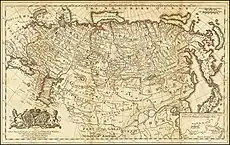Timeline of Nizhny Novgorod
The following is a timeline of the history of the city of Nizhny Novgorod, Russia.
Prior to 20th century
Part of a series on the |
||||||||||||||
|---|---|---|---|---|---|---|---|---|---|---|---|---|---|---|
| History of Russia | ||||||||||||||
 | ||||||||||||||
|
Prehistory • Antiquity • Early Slavs
Feudal Rus' (1097–1547) Novgorod Republic • Vladimir-Suzdal Mongol conquest • Grand Duchy of Moscow
Russian Revolution (1917–1923) February Revolution • Provisional Government
|
||||||||||||||
|
Timeline 860–1721 • 1721–1796 • 1796–18551855–1892 • 1892–1917 • 1917–1927 1927–1953 • 1953–1964 • 1964–1982 1982–1991 • 1991–present |
||||||||||||||
|
| ||||||||||||||
- 1221 – Nizhny Novgorod "founded by Vladimir princes as outpost against Mordvinians and Volga Bulgars."[1]
- 1227 – Cathedral of St. Michael the Archangel (Nizhny Novgorod) built.
- 1330 – Pechersky Ascension Monastery founded (approximate date).
- 1370 – Convent of the Annunciation founded.[2]
- 1393 – Nizhny Novgorod becomes part of the Grand Duchy of Moscow.[1]
- 1515 – Nizhny Novgorod Kremlin built.
- 1631 – Cathedral of St. Michael the Archangel (Nizhny Novgorod) rebuilt.
- 1719 – Stroganov church built.[1]
- 1817 – Annual Makaryev Fair begins.[1]
- 1822 – Old Fair Church of the Transfiguration (Nizhny Novgorod) built.
- 1849 – Nizhny Novgorod Machine Factory established.
- 1862 – Nizhny Novgorod railway station opens.
- 1867 – Population: 40,742.[3]
- 1881 – Population: 57,530.[4]
- 1884 – 7 July: Ethnic unrest.[5]
- 1896 – All-Russia Exhibition 1896 held; Shukhov Rotunda built.
- 1897 – Population: 98,503.
20th century
- 1909 – Kozma Minin newspaper begins publication.
- 1913 – Population: 112,300.[6]
- 1917 – Nizhny Novgorod State Technical University founded.
- 1918 – N. I. Lobachevsky State University of Nizhny Novgorod[7] and Nizhny Novgorod Radio Laboratory established.
- 1920 – Nizhny Novgorod State Medical Academy established.
- 1926 – Population: 222,356.[1]
- 1929
- Shukhov Towers erected.
- Nizhny Novgorod Oblast created.[7]
- Sormovo becomes part of city.[1]
- 1931 – Avtozavodsky City District established.
- 1932
- City renamed "Gorky."[7]
- Gorky Automobile Plant established.[8]
- Lokomotiv Stadium opens.
- 1939 – Population: 644,116.[1]
- 1941-1943 – Bombing of Gorky.
- 1946 – Russian Federal Nuclear Center established.[9]
- 1963 – FC Volga Nizhny Novgorod (football club) formed.
- 1965
- Bor bridge built.
- Population: 1,085,000.[10]
- 1970 – Sovetsky City District established.
- 1979 – Population: 1,367,000.[11]
- 1985 – Nizhny Novgorod Metro begins operating.[7]
- 1989 – Population: 1,438,133.
- 1990 – Nizhny Novgorod Chamber of Commerce established.[7]
- 1991 – Boris Nemtsov becomes governor of Nizhny Novgorod Oblast.[7]
- 1992 – GAZ privatized.[12]
- 1994
- Nizhny Novgorod International Airport in operation.[7]
- Ivan Petrovich Sklyarov becomes mayor.[13]
- 2000 – City becomes part of the Volga Federal District.
21st century
- 2002 – Burevestnik (Nizhny Novgorod Metro) opens.
- 2010 – Population: 1,250,619.
- 2012 – Nizhny Novgorod cable car to Bor begins operating.
- 2016 – 70th Anniversary of Victory Plant built.
- 2017 – Bor bridge II built.
See also
- Nizhny Novgorod history
- History of Nizhny Novgorod
- Other names of Nizhny Novgorod
- Timelines of other cities in the Volga Federal District of Russia: Kazan, Samara
References
- Leon E. Seltzer, ed. (1952), "Gorki", Columbia Lippincott Gazetteer of the World, New York: Columbia University Press, p. 698, OL 6112221M
- Baedeker 1914.
- George Ripley; Charles A. Dana, eds. (1879). "Nizhni Novgorod". American Cyclopedia (2nd ed.). New York: D. Appleton and Company.
- "Russia". Statesman's Year-Book. London: Macmillan and Co. 1885.
- Jewish Encyclopedia 1907.
- "Russia: Principal Towns: European Russia". Statesman's Year-Book. London: Macmillan and Co. 1921.
- Eastern Europe, Russia and Central Asia 2003. Europa Publications. 2002. ISBN 978-1-85743-137-7.
- Austin 2004.
- "Organizations". International Relations and Security Network. Switzerland: Eidgenössische Technische Hochschule Zürich. Retrieved 30 March 2015.
- "Population of capital cities and cities of 100,000 and more inhabitants". Demographic Yearbook 1965. New York: Statistical Office of the United Nations. 1966.
Gorky
- Henry W. Morton and Robert C. Stuart, ed. (1984). The Contemporary Soviet City. New York: M.E. Sharpe. p. 4. ISBN 978-0-87332-248-5.
- "Turin meets Detroit—on the Volga", The Economist, 5 March 1998
- Robert W. Orttung, ed. (2000). Republics and Regions of the Russian Federation: A Guide to Politics, Policies, and Leaders. M.E. Sharpe. ISBN 978-0-7656-0559-7.
This article incorporates information from the Russian Wikipedia.
Bibliography
- Abraham Rees (1819), "Niznei Novgorod", The Cyclopaedia, London: Longman, Hurst, Rees, Orme & Brown – via Hathi Trust
- John Geddie (1885). "Nishni-Novgorod". Russian Empire: its Rise and Progress. London: T. Nelson.
- "Nijni-Novgorod", Hand-book for Travellers in Russia, Poland, and Finland (4th ed.), London: J. Murray, 1888
- "Nijni-Novgorod", Jewish Encyclopedia, 9, New York, 1907
- "Nizhniy-Novgorod", Encyclopædia Britannica (11th ed.), New York, 1910, OCLC 14782424
- "Nizhni-Novgorod", Russia, Leipzig: Karl Baedeker, 1914, OCLC 1328163
- William Henry Beable (1919), "Nijni-Novgorod", Russian Gazetteer and Guide, London: Russian Outlook
- Trudy Ring, ed. (1995). "Nizhny Novgorod". International Dictionary of Historic Places: Northern Europe. Fitzroy Dearborn. p. 541. ISBN 978-1-136-63944-9.
- Richard Cartwright Austin (2004). Building Utopia: Erecting Russia's First Modern City, 1930. Kent State University Press. ISBN 978-0-87338-730-9. (About Nizhny Novgorod)
- Catherine Evtuhov (2006). "Nizhnii Novgorod in the 19th century". In Dominic Lieven (ed.). Imperial Russia, 1689–1917. Cambridge History of Russia. Cambridge University Press. p. 264+. ISBN 978-0-521-81529-1.
External links
| Wikimedia Commons has media related to Nizhny Novgorod. |
This article is issued from Wikipedia. The text is licensed under Creative Commons - Attribution - Sharealike. Additional terms may apply for the media files.